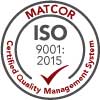Skilled MATCOR technicians are available for short-, medium- or long-term engagements.
Labor shortages are right up there with supply chain challenges for businesses everywhere. Unfortunately, the oil and gas industry is front and center in the conversation about chronic labor challenges.

Several factors are at play.
Oil and Gas: A Less Popular Career Choice
Boom-and-bust cycles are endemic to the oil and gas business. This, along with the persistent demonizing of the industry in the media, has resulted in the oil and gas industry becoming much less desirable to potential talent entering the workforce.
In fact, only 2 percent of US College graduates consider the oil and gas industry their top choice for employment. It is no surprise that the industry struggles to compete for talent with other more appealing high tech, pharmaceutical and green energy sector industries for scarce technical talent.
Demographics
Skilled laborers are retiring from the oil and gas industry at a faster rate than ever before. This “Baby Boomer Brain Drain”, where experienced, skilled labor leaves the workplace faster than younger, less experienced workers are entering the workplace, continues to have a profound impact on midstream companies.
Regulatory Issues
Finally, the advent of the PHMSA Mega Rule places additional regulatory scrutiny on the oil and gas industry. As a result, companies will see their scarce technical labor resources stretched even further.
MATCOR’s Answer to the Oil and Gas Industry Labor Shortage: Corrosion Technicians for Hire
MATCOR is here to help. As a service provider we are constantly bringing in and developing technical talent. Our pipeline of technicians are available to fill the gaps.
Short-, medium- or long-term engagements enable our technicians to provide the additional labor needed to keep your business moving.
Additionally, MATCOR’s engineering team can design and install remote monitoring systems. This automates the data collection required for regulatory compliance and reduces the strain on local corrosion technicians.
For information on hiring MATCOR skilled technicians or our engineering services, please contact us at the link below, or reach out to your local MATCOR account manager.
Contact a Corrosion Expert





